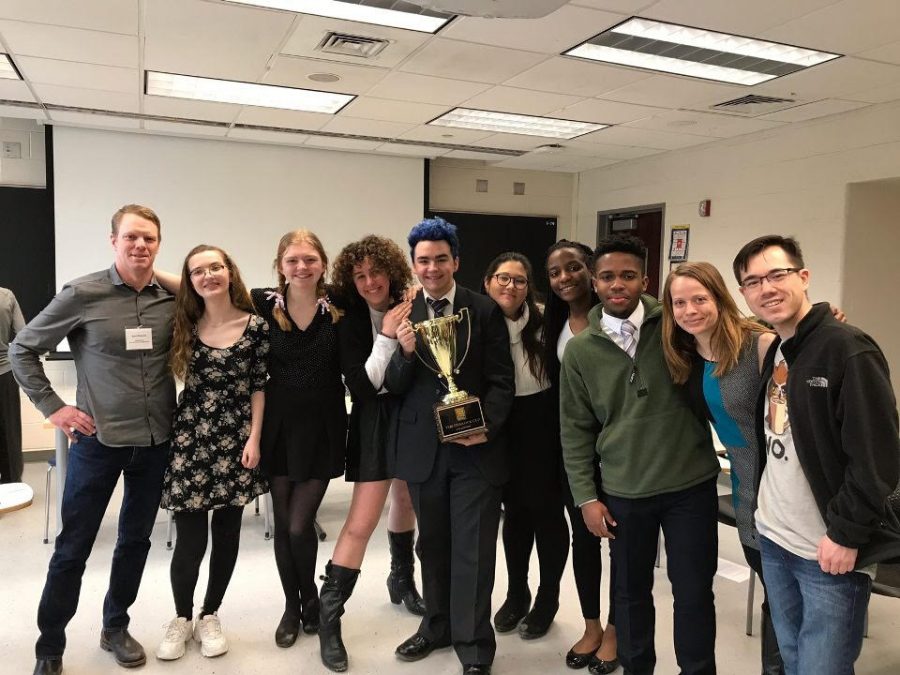Pioneer team wins the Michigan Ethics Bowl competition
The Ann Arbor Pioneer Ethics team defeated Greenhills School Feb. 3 to win the Michigan State Competition. On the way to victory, Pioneer beat a total of 16 teams from 10 different schools. Next up: the national tournament in Chapel Hill, N.C., April 5-7, where Pioneer’s team can earn the right to call themselves the best Ethics Bowl team in the country.
Ann Arbor Pioneer has had an Ethics Bowl team for six years, beginning in the 2013-14 school year, when the Michigan State Competition also began. For all six years, the team has been advised by Pioneer social studies teacher Brent Richards. Richards says when he started Pioneer’s Ethics Bowl club, he was not anticipating a big turnout because the club would be so focused on academics. However, he recalls, “When I asked my sophomores in U.S. history whether they thought it sounded interesting, I got a really positive response.” That response and the commitment to the club was so positive that in their first year, the team made it all the way to the State Finals. After that, the club’s popularity and success continued, and in 2015, Pioneer sent their first team to the National Competition. This year, Richards even had to limit membership in the club because he could only field two teams of seven kids, and 20 students turned out to participate.
Despite the club’s increasing popularity, its members say not all students understand exactly what an Ethics Bowl competition entails. “Ethics has some similarities to debate, but in Ethics [Bowl], both teams are given the same issue, and then you can take any stance you want,” explains Richards. This means two teams might be arguing the same side of an issue, unlike in debate where teams must take opposite stances.
Another major difference in Ethics is you lose points for trying to poke holes in the other team’s argument. “This is because the point of ethics is to promote an idea of civil conversation, which is so sadly rare in our culture today,” says Richards. “It is cooperative disagreement.”
The competition itself is also dissimilar to debate in that, while an ethics team does present an opening argument and responds to the opposition’s point of view, the topics the teams tackles are more complex, life-like case studies, not the one-sentence questions debate teams typically argue. Also, after each team has presented an argument and response, they must answer questions from the judges, and these responses are rated, making up a third of the team’s total score.
In order to be ready for these complex case studies and the questions they may face, the Pioneer Ethics Bowl team puts in hours of research and argument preparation. Pioneer senior Mirian Nweze, a member of the team headed to Nationals, describes the workload as “pretty intense.” Her teammate, Pioneer senior Annika Hockman, says that to prepare for Nationals they are currently meeting for three hours, four days a week.
The time investment is even more impressive when one considers that Richards describes the club as, “student-led and motivated. They are the ones that deserve 90 percent of the credit for everything they’re doing.”
Both Nweze and Hockman are new to Ethics Bowl this year, as is most of their team (there were only two returning members from the 2017-18 Ethics bowl team). Thus, going into the state competition, Hockman says their mentality was, “just have fun, but then we just kept winning and the stress started building.” She attributes their success to the chemistry that came with all of their preparation and practice and the fact that the team has a variety of interests and expertise. “We have some team members that are good with medicine and some that are good with politics,” says Hockman.
After Nationals are over, win or lose, both students say they think the Ethics team experience will stay with them. Nweze says it has already impacted her life. “I often find myself applying ethics to things that I never thought about before, like conversations at school,” she said.
Hockman says it may impact her career choice one day. “I might like to go into international law and diplomacy, and the Ethics team experience should help,” she says.


